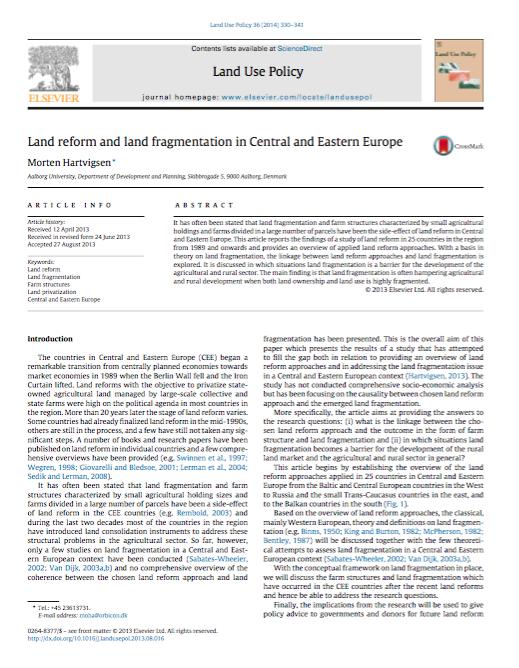Location
Land Use Policy is an international and interdisciplinary journal concerned with the social, economic, political, legal, physical and planning aspects of urban and rural land use. It provides a forum for the exchange of ideas and information from the diverse range of disciplines and interest groups which must be combined to formulate effective land use policies. The journal examines issues in geography, agriculture, forestry, irrigation, environmental conservation, housing, urban development and transport in both developed and developing countries through major refereed articles and shorter viewpoint pieces.
Land Use Policy aims to provide policy guidance to governments and planners and it is also a valuable teaching resource.
ISSN: 0264-8377
Members:
Resources
Displaying 276 - 279 of 279The “sowing of concrete”: Peri-urban smallholder perceptions of rural–urban land change in the Central Peruvian Andes
Policy makers concerned with the peri-urban interface find their greatest challenges in the rapid urban growth of developing mountain regions, since limitations caused by relief and altitude often lead to an increased competition between rural and urban land use at the valley floors. In this context, little attention has been paid to the affected agriculturalists’ perceptions of peri-urban growth—important information required for the realization of sustainable land use planning. How is the process of rural–urban land change perceived and assessed by peri-urban smallholder communities?
The agricultural, environmental and socio-political repercussions of Brazil's land governance system
Although many contemporary studies of agriculture associate larger properties with higher relative productivity, this assumption has limited relevancy for the analysis of situations in which property owners profit more from large-scale property accumulation itself rather than any superiority in exploitation opportunities offered by increased size. In Brazil, the efficiency-of-scale paradigm has been used to criticize peasant agriculture as unproductive and hide contradictions deriving from land concentration.
Land reform and land fragmentation in Central and Eastern Europe
It has often been stated that land fragmentation and farm structures characterized by small agricultural holdings and farms divided in a large number of parcels have been the side-effect of land reform in Central and Eastern Europe. This article reports the findings of a study of land reform in 25 countries in the region from 1989 and onwards and provides an overview of applied land reform approaches. With a basis in theory on land fragmentation, the linkage between land reform approaches and land fragmentation is explored.
Population-dynamics focussed rapid rural mapping and characterisation of the peri-urban interface of Kampala, Uganda
In developing countries, cities are rapidly expanding and urban and peri-urban agriculture (UPA) has an important role in feeding these growing urban populations; however such agriculture also carries public health risks such as zoonotic disease transmission. It is important to assess the role of UPA in food security and public health risks to make evidence-based decisions on policies. Describing and mapping the peri-urban interface (PUI) are the essential first steps for such an assessment.




